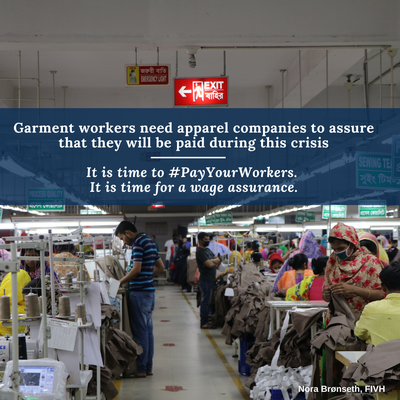
On June 1, the Clean Clothes Campaign, in which MSN is an active member, launched a campaign calling on global garment and footwear brands to guarantee workers in their supply chains are paid their full salaries during the COVID crisis. The wage payment demand is central to the global network's broader call that brands, retailers, governments and other stakeholders work together to mitigate the impacts of the COVID-19 pandemic on workers and, moving forward, to ensure that workers receive living wages and a social safety net.
Garment workers need companies’ assurance they will be fully paid during this crisis
Garment workers are among those most economically vulnerable in the COVID-19 crisis, due to structural inequalities in global garment supply chains.
By cancelling orders, delaying placement of new orders, or forcing discounts on goods already produced, apparel companies have created a situation where factories are unable to pay workers on time or at all. After recent public outcry, a number of companies have committed to paying in full for all orders placed before the pandemic hit. But that is not enough.
Labour rights organizations and unions are now urging apparel companies to publicly guarantee that all apparel, textile, footwear, and logistics workers in their supply chain who were employed at the onset of the COVID-19 crisis will receive their legally mandated or regular wages and benefits, whichever is greater, including back pay or severance pay, if applicable. Furthermore, we are urging companies to assure payment of a price premium on future orders into a guarantee fund reserved to support stronger social protections for workers.
Companies have a responsibility to prevent, mitigate, and remedy the human rights violations in their supply chains. By ensuring that workers receive their due wages, companies fulfil part of their due diligence obligations, which also include ensuring non-discriminatory treatment of workers, social protection, and safe working conditions that do not expose workers to infection or other health risks.
The organizations in the Clean Clothes Campaign network will start reaching out to apparel companies with these demands directly as well as through an upcoming campaign.
Companies commit to the wage assurance by publishing the following statement:
[Apparel company X] hereby publicly assures that all apparel, textile, footwear, and logistics workers in our supply chain, who were employed at the onset of the Covid-19 crisis, regardless of employment status, will be paid their legally mandated or regular wages and benefits, whichever is higher. This includes wage arrears (back pay) and, where applicable, negotiated severance pay.
We will contribute funds of a sufficient amount to ensure that, when combined with other support provided to workers by employers, local governments, and international institutions, workers have income equal to what they received prior to the crisis. In doing so, we provide immediate much needed relief for workers, and we act upon our responsibility to prevent and mitigate adverse human rights impacts in our supply chains, and to provide for or cooperate in the remediation of harm.
Going forward, we will support stronger social protections for workers by committing to a price premium on future orders to be paid into a guarantee fund reserved for severance and outstanding wages in cases where employers in our supply chain have gone insolvent, or otherwise have terminated workers, through signing of an enforceable agreement with garment worker unions, in line with ILO Recommendation 202, Convention 95 and Convention 76.
Background
From the start of this pandemic, as the supply of raw materials from China dried up, garment workers have suffered economically, with workers in Asia faced with factory closures and non-payment of wages and severance pay. Since March, when many countries initiated national lockdowns to contain the virus, garment workers have worked in unsafe conditions, not been paid their wages, and suffered (discriminatory) dismissals or retrenchment as apparel brands suddenly cancelled or refused to pay the agreed price for orders. Poverty pay is endemic across the industry and, for garment workers, being paid late means not having sufficient money to buy food. In Bangladesh, thousands of workers have had little choice but to take to the streets in mass protests since April, initially to demand their March wages, then their April wages, and more recently their legally-owed bonuses for Eid.
Apparel companies have profited for decades from low wage labour – which generally amounts to just a third of a living wage – in countries with little social protection and lax labour laws. This enabled them to build up profits that lined the deep pockets of billionaire company owners and shareholders. By consciously taking the risk to build profits on the ultimate low-cost system that did not allow for the establishment of social protection mechanisms or pay workers enough to save, these companies now have to face the consequences and pay workers what they are due.
Trade unions across Asia have demanded a quantified Supply-chain Relief Contribution (SRC) payable by brands to workers employed in their specific supply chains. Furthermore, companies, global trade union federations, and the International Labour Organisation have launched a garment industry call to action to raise funds through international financial institutions and donor governments. The wage assurance launched today builds on these initiatives and is intended to fill the gap between the funds raised through these existing programmes and the wage sum owed to workers in garment supply chains.
More information
- Report: Un(der)paid in the pandemic - an estimate of what the garment industry owes its workers
- Pay Your Workers Campaign (Clean Clothes Campaign)
- Covid-19 Tracker: Which Brands Are Acting Responsibly toward Suppliers and Workers?
- Click here for the CCC’s May 18 statement with a broader set of demands to brands, retailers, e-tailers and governments
- COVID-19: Action in the Global Garment Industry (ILO)